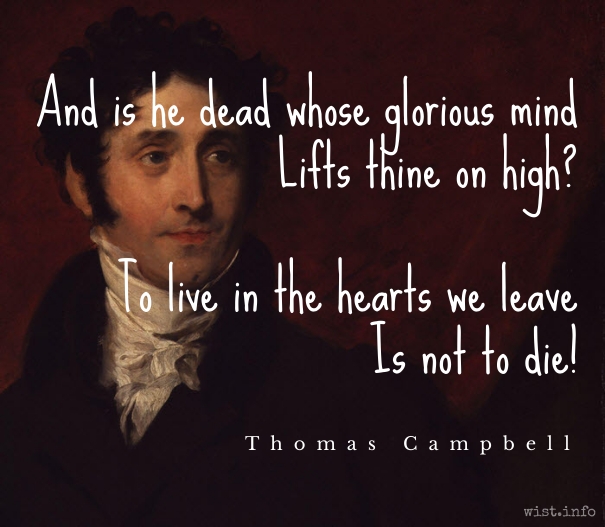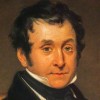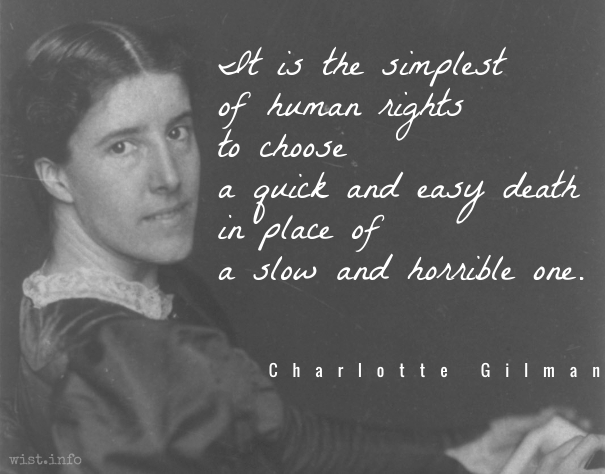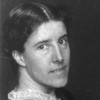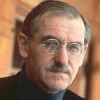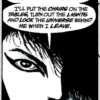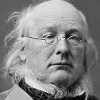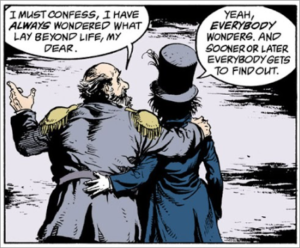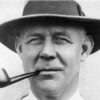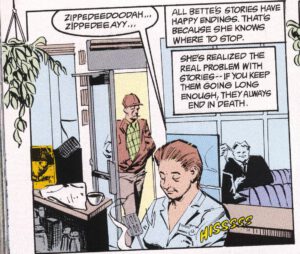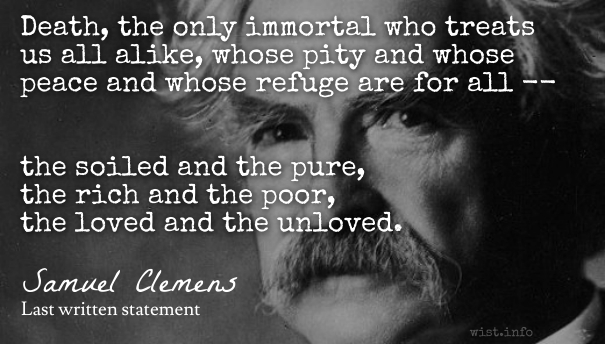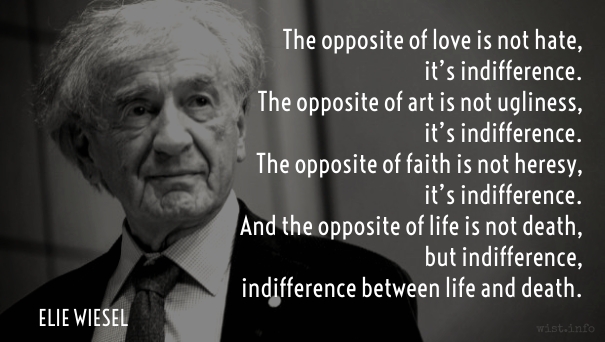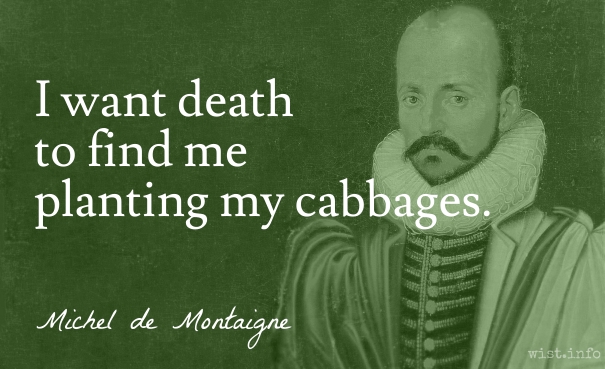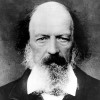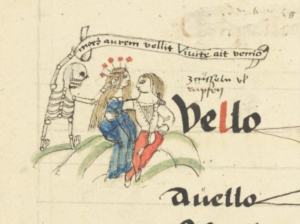O poor mortals, how ye make this Earth bitter for each other; this fearful and wonderful Life fearful and horrible; and Satan has his place in all hearts! Such agonies and ragings and wailings ye have, and have had, in all times: — to be buried all, in so deep silence; and the salt sea is not swoln with your tears.
Thomas Carlyle (1795-1881) Scottish essayist and historian
The French Revolution: A History, Part 1, Book 5, ch. 5 (1.5.5) (1837)
(Source)
As the prospect of violence mounts within Paris on the night of 13 July 1789. The next day was the storming of the Bastille.
Quotations about:
death
Note not all quotations have been tagged, so Search may find additional quotes on this topic.
As long as we love we will hope to live, and when the one dies that we love we will say: “Oh, that we could meet again,” and whether we do or not it will not be the work of theology. It will be a fact in nature. I would not for my life destroy one star of human hope, but I want it so that when a poor woman rocks the cradle and sings a lullaby to the dimpled darling, she will not be compelled to believe that ninety-nine chances in a hundred she is raising kindling wood for hell.
Robert Green Ingersoll (1833-1899) American lawyer, agnostic, orator
“What Must We Do To Be Saved?” Sec. 11 (1880)
(Source)
Heaven is where those are we love, and those who love us. And I wish to go to no world unless I can be accompanied by those who love me here. Talk about the consolations of this infamous doctrine. The consolations of a doctrine that makes a father say, “I can be happy with my daughter in hell;” that makes a mother say, “I can be happy with my generous, brave boy in hell;” that makes a boy say, “I can enjoy the glory of heaven with the woman who bore me, the woman who would have died for me, in eternal agony.” And they call that tidings of great joy.
Robert Green Ingersoll (1833-1899) American lawyer, agnostic, orator
“What Must We Do To Be Saved?” Sec. 9 (1880)
(Source)
Arise, arise, Riders of Théoden!
Fell deeds awake, fire and slaughter!
Spear shall be shaken, shield be splintered,
A sword-day, a red day, ere the sun rises!
Ride now, ride now! Ride to Gondor!J.R.R. Tolkien (1892-1973) English writer, fabulist, philologist, academic [John Ronald Reuel Tolkien]
The Lord of the Rings, Vol. 3: The Return of the King, Book 5, ch. 5 “The Ride of the Rohirrim” [Theoden] (1955)
(Source)
In the Peter Jackson film, the last line is merged with another Theoden line from ch. 6, as he lies dying: "Death! Ride, ride to ruin, and the world's ending!"
No one wants to die. Even people who want to go to heaven don’t want to die to get there. And yet death is the destination we all share. No one has ever escaped it. And that is as it should be, because Death is very likely the single best invention of Life. It is Life’s change agent. It clears out the old to make way for the new. Right now the new is you, but someday not too long from now, you will gradually become the old and be cleared away. Sorry to be so dramatic, but it is quite true.
Steve Jobs (1955-2011) American computer inventor, entrepreneur
Commencement Address, Stanford University (2005)
(Source)
MACBETH: To-morrow, and to-morrow, and to-morrow,
Creeps in this petty pace from day to day
To the last syllable of recorded time,
And all our yesterdays have lighted fools
The way to dusty death. Out, out, brief candle!
Life’s but a walking shadow, a poor player
That struts and frets his hour upon the stage
And then is heard no more: it is a tale
Told by an idiot, full of sound and fury,
Signifying nothing.William Shakespeare (1564-1616) English dramatist and poet
Macbeth, Act 5, sc. 5, l. 22ff (5.5.22-31) (1606)
(Source)
Remembering that I’ll be dead soon is the most important tool I’ve ever encountered to help me make the big choices in life. Because almost everything — all external expectations, all pride, all fear of embarrassment or failure — these things just fall away in the face of death, leaving only what is truly important. Remembering that you are going to die is the best way I know to avoid the trap of thinking you have something to lose.
Steve Jobs (1955-2011) American computer inventor, entrepreneur
Commencement Address, Stanford University (2005)
(Source)
A Good life fears not Life nor Death.
Thomas Fuller (1654-1734) English physician, preacher, aphorist, writer
Gnomologia: Adages and Proverbs, # 157 (1732)
(Source)
Deserves death! I daresay he does. Many that live deserve death. And some die that deserve life. Can you give that to them? Then be not too eager to deal out death in the name of justice, fearing for your own safety. Even the wise cannot see all ends.
J.R.R. Tolkien (1892-1973) English writer, fabulist, philologist, academic [John Ronald Reuel Tolkien]
The Lord of the Rings, Vol. 2: The Two Towers, Book 4, ch. 1 “The Taming of Sméagol” (1954)
(Source)
Frodo recalling the words of Gandalf (approximately) in The Fellowship of the Ring.
And is he dead whose glorious mind
Lifts thine on high?
To live in the hearts we leave
Is not to die!
Human life consists in mutual service. No grief, pain, misfortune, or “broken heart,” is excuse for cutting off one’s life while any power of service remains. But when all usefulness is over, when one is assured of an unavoidable and imminent death, it is the simplest of human rights to choose a quick and easy death in place of a slow and horrible one.
Croesus said to Cambyses: That peace was better than war; because in peace the sons did bury their fathers, but in wars the fathers did bury their sons.
Francis Bacon (1561-1626) English philosopher, scientist, author, statesman
Apophthegms, #149 (1625)
See Herodotus.
Men fear death as children fear to go in the dark; and as that natural fear in children is increased with tales, so is the other.
Francis Bacon (1561-1626) English philosopher, scientist, author, statesman
“Of Death,” Essays, No. 2 (1625)
(Source)
DEATH: When the first living thing existed, I was there, waiting. When the last living thing dies, my job will be finished. I’ll put the chairs on the tables, turn out the lights and lock the universe behind me when I leave.
Neil Gaiman (b. 1960) British author, screenwriter, fabulist
Sandman, Book 3. Dream Country, # 20 “Façade” (1990)
(Source)
Let the sweet Muses lead me to their soft retreats, their living fountains, and melodious groves, where I may dwell remote from care, master of myself … let me no more be seen in the wrangling forum, a pale and odious candidate for precarious fame … let me live free from solicitude … and when nature shall give the signal to retire may I possess no more than I may bequeath to whom I will. At my funeral let no token of sorrow be seen, no pompous mockery of woe. Crown me with chaplets; strew flowers on my grave, and let my friends erect no vain memorial to tell where my remains are lodged.
Tacitus (c.56-c.120) Roman historian, orator, politician [Publius or Gaius Cornelius Tacitus]
“A Dialogue on Oratory,” sec. 13, Dialogus, Agricola, Germania
In The Works of Tacitus, Oxford trans., rev., vol. 2, (1854). The above is the version read at the funeral for Justice Hugo Black. The printed version differs in reading, at the start, "Me let the sweet Muses lead," and in using "anxious" for "odious."
Alt trans. (Peterson (1914)): "As for myself, may the 'sweet Muses,' as Virgil says, bear me away to their holy places where sacred streams do flow, beyond the reach of anxiety and care, and free from the obligation of performing each day some task that goes against the grain. May I no longer have anything to do with the mad racket and the hazards of the forum, or tremble as I try a fall with white-faced Fame. I do not want to be roused from sleep by the clatter of morning callers or by some breathless messenger from the palace; I do not care, in drawing my will, to give a money-pledge for its safe execution through anxiety as to what is to happen afterwards; I wish for no larger estate than I can leave to the heir of my own free choice. Some day or other the last hour will strike also for me, and my prayer is that my effigy may be set up beside my grave, not grim and scowling, but all smiles and garlands, and that no one shall seek to honour my memory either by a motion in the senate or by a petition to the Emperor."
Fame is a vapor; popularity an accident; riches take wings; the only earthly certainty is oblivion ….
Horace Greeley (1881-1872) American newspaper editor, reformer, politician
Recollections of a Busy Life, ch. 18 (1868)
(Source)
Quoted by Mark Twain in his Notebook (1869), and often attributed to him. Frequently misquoted as "Fame is a vapor; popularity an accident; riches take wings; those who cheer today will curse tomorrow; only one thing endures: character." More discussion of this quotation here.
NORTON I: I must confess, I have always wondered what lay beyond life, my dear.
DEATH: Yeah, everybody wonders. And sooner or later everybody gets to find out.
Neil Gaiman (b. 1960) British author, screenwriter, fabulist
Sandman, Book 6. Fables and Reflections, # 31 “Three Septembers and a January” (1991-10)
(Source)
For when the One Great Scorer comes to mark against your name,
He writes — not that you won or lost — but how you played the Game.
All Bette’s stories have happy endings. That’s because she knows where to stop. She’s realized the real problem with stories — if you keep them going long enough, they always end in death.
Neil Gaiman (b. 1960) British author, screenwriter, fabulist
Sandman, Book 1. Preludes and Nocturnes, # 6 “24 Hours” (1989-06)
(Source)
Death, the only immortal who treats us all alike, whose pity and whose peace and whose refuge are for all — the soiled and the pure, the rich and the poor, the loved and the unloved.
Mark Twain (1835-1910) American writer [pseud. of Samuel Clemens]
Last written note
(Source)
Recorded by A. Paine (his literary executor), Mark Twain: A Biography, Vol III, Part 2, ch. 293 (1912).
Only when man’s life comes to its end in prosperity can one call that man happy.
Aeschylus (525-456 BC) Greek dramatist (Æschylus)
Agamemnon, l. 928
Alt trans.:Compare to Sophocles.
- "Call no man happy till he is dead."
- "Hold him alone truly fortunate who has ended his life in happy well-being."
Indifference, to me, is the epitome of evil.
The opposite of love is not hate, it’s indifference.
The opposite of art is not ugliness, it’s indifference.
The opposite of faith is not heresy, it’s indifference.
And the opposite of life is not death, but indifference,
indifference between life and death.Elie Wiesel (1928-2016) Romanian-American novelist, professor, political activist, Nobel Laureate.
“One Must Not Forget,” interview by Alvin P. Sanoff, US News & World Report (27 Oct 1986)
See also Nietzsche.
HAMLET:Who would fardels bear,
To grunt and sweat under a weary life,
But that the dread of something after death,
The undiscovered country from whose bourn
No traveler returns, puzzles the will
And makes us rather bear those ills we have
Than fly to others that we know not of?William Shakespeare (1564-1616) English dramatist and poet
Hamlet, Act 3, sc. 1, l. 84ff (3.1.84-90) (c. 1600)
(Source)
"Fardels" = "burdens"
It’s not that I’m afraid to die. I just don’t want to be there when it happens.
Woody Allen (b. 1935) American comedian, writer, director [b. Allan Steward Konigsberg]
“Death (A Play)”, Without Feathers (1975)
Some of them left a name behind them, so that their praises are still sung. While others have left no memory, and disappeared as though they had not existed, they are now as though they had never been, and so too, their children after them.
The Bible (The Old Testament) (14th - 2nd C BC) Judeo-Christian sacred scripture [Tanakh, Hebrew Bible], incl. the Apocrypha (Deuterocanonicals)
Sirach (Ecclesiasticus) 44:8-9 [JB (1966)]
(Source)
Alternate translations:
There be some of them, that have left a name behind them, that their praises might be reported. And some there be, which have no memorial; who are perished, as though they had never been; and are become as though they had never been born; and their children after them.
[KJV (1611)]
They that were born of them have left a name behind them, that their praises might be related: And there are some, of whom there is no memorial: who are perished, as if they had never been: and are become as if they had never been born, and their children with them.
[DRA (1899)]
Some of them left a reputation, and people still praise them today. There are others who are not remembered, as if they had never lived, who died and were forgotten, they, and their children after them.
[GNT (1976)]
Some of them have left behind a name, so that others declare their praise. But of others there is no memory; they have perished as though they had never existed; they have become as though they had never been born, they and their children after them.
[NRSV (1989 ed.)]
All changes, even the most longed for, have their melancholy; for what we leave behind us is a part of ourselves; we must die to one life before we can enter into another!
Anatole France (1844-1924) French poet, journalist, novelist, Nobel Laureate [pseud. of Jaques-Anatole-François Thibault]
The Crime of Sylvestre Bonnard, Part 2, ch. 4 (1881) [tr. L. Hearn (1890)]
(Source)
I had rather live and love where death is king, than have eternal life where love is not.
Robert Green Ingersoll (1833-1899) American lawyer, agnostic, orator
“At a Child’s Grave” (8 Jan 1882)
(Source)
The world is so exquisite with so much love and moral depth, that there is no reason to deceive ourselves with pretty stories for which there’s little good evidence. Far better it seems to me, in our vulnerability, is to look death in the eye and to be grateful every day for the brief but magnificent opportunity that life provides.
Why should we fear that which will come to all that is? We cannot tell, we do not know, which is the greater blessing — life or death. We do not know whether the grave is the end of this life, or the door of another, or whether the night here is not somewhere else at dawn. Neither can we tell which is the more fortunate — the child dying in its mother’s arms, before its lips have learned to form a word, or he who journeys all the length of life’s uneven road, painfully taking the last slow steps with staff and crutch.
Robert Green Ingersoll (1833-1899) American lawyer, agnostic, orator
“At a Child’s Grave” (8 Jan 1882)
(Source)
Everyone must leave something behind when he dies, my grandfather said. A child or a book or a painting or a house or a wall built or a pair of shoes made. Or a garden planted. Something your hand touched some way so your soul has somewhere to go when you die, and when people look at that tree or that flower you planted, you’re there. It doesn’t matter what you do, he said, so as long as you change something from the way it was before you touched it into something that’s like you after you take your hands away.
Ray Bradbury (1920-2012) American writer, futurist, fabulist
Fahrenheit 451, ch. 3 [Granger] (1953)
(Source)
At thirty, man suspects himself a fool;
Knows it at forty, and reforms his plan;
At fifty, chides his infamous delay,
Pushes his prudent purpose to resolve;
In all the magnanimity of thought
Resolves, and re-resolves; then dies the same.
And why? Because he thinks himself immortal.
All men think all men mortal but themselves.Edward Young (1683-1765) English poet
The Complaint: Or, Night Thoughts, Vol. 1, No. 1 “Night the First: On Death, Life, and Immortality,” l. 418ff (1742-05) (1744)
(Source)
I hold it true, whate’er befall;
I feel it, when I sorrow most;
‘Tis better to have loved and lost
Than never to have loved at all.
And thou wilt give thyself relief if thou doest every act of thy life as if it were the last, laying aside all carelessness and passionate aversion from the commands of reason, and all hypocrisy, and self-love, and discontent with the portion which has been given to thee.
Marcus Aurelius (AD 121-180) Roman emperor (161-180), Stoic philosopher
Meditations, Book 2, #5 [tr. Long (1862)]
(Source)
Usually modernized, "And you will give yourself relief, if you do every act of your life as if it were the last, laying aside all carelessness and passionate aversion from the commands of reason, and all hypocrisy, and self-love, and discontent with the portion which has been given to you," and the source of the more common (and mixed-message) reduction of this aphorism, "Do every act of your life as if it were your last."
Alternate translations:
Go about every action as thy last action, free from all vanity, all passionate and wilful aberration from reason, and from all hypocrisy, and self-love, and dislike of those things, which by the fates or appointment of God have happened unto thee.
[tr. Casaubon (1634), #2]
Perform every action as if it were your last; if your appetites and passions do not cross upon your reason; if you keep clear of rashness, and have nothing of insincerity and self-love to infect you, and do not complain of your destiny.
[tr. Zimmern (1887)]
Do each act as though it were your last, freed from every random aim, from wilful turning away from the directing Reason, from pretence, self-love and displeasure with what is allotted to you.
[tr. Farquharson (1944)]
Approach each action as though it were your last, dismissing the wayward thought, the emotional recoil from the commands of reason, the desire to create an impression, the admiration of self, the discontent with your lot.
[tr. Staniforth (1964)]
Perform every action in your life as if it were your last, putting aside all aimlessness and emotional resistance to the choices of reason, and all pretense, selfishness, and discontent with what has been allotted to you.
[tr. Needleman/Piazza (2008)]
The graveyards are full of people the world could not do without.
Elbert Hubbard (1856-1915) American writer, businessman, philosopher
“The Philistine” (May 1907)
(Source)
Sometimes misquoted as:Also attributed to Charles DeGaulle, Georges Clemenceau, and many others. More discussion: The Graveyards Are Full of Indispensable Men – Quote Investigator.
- "The graveyards are full of indispensable men"
- "The cemeteries are full of indispensable men."
- "The cemeteries are filled with people who thought the world could not get along without them."
Deserves it! I daresay he does. Many that live deserve death. And some that die deserve life. Can you give it to them? then do not be too eager to deal out death in judgment. For even the very wise cannot see all ends.
J.R.R. Tolkien (1892-1973) English writer, fabulist, philologist, academic [John Ronald Reuel Tolkien]
The Lord of the Rings, Vol. 1: The Fellowship of the Ring, Book 1, ch. 2 “The Shadow of the Past” [Gandalf] (1954)
(Source)
Frodo later recounts these words (approximately) to Sam in The Two Towers.
All tragedies are finish’d by a death,
All comedies are ended by a marriage;
The future states of both are left to faith.
Death be not proud, though some have callèd thee
Mighty and dreadfull, for, thou art not so,
For, those, whom thou think’st, thou dost overthrow,
Die not, poore death, nor yet canst thou kill me.John Donne (1572-1631) English poet
Holy Sonnets, No. 10, “Death Be Not Proud,” ll. 1-4 (1609)
(Source)
It is nothing to die; it is horrible not to live.
[Ce n’est rien de mourir; c’est affreux de ne pas vivre.]
People living deeply have no fear of death.
Death twitches my ear. “Live,” he says; “I am coming.”
[Pereat qui crastina curat.
Mors aurem vellens Vivite, ait, venio.]Virgil (70-19 BC) Roman poet [b. Publius Vergilius Maro; also Vergil]
“Copa [The Dancing Girl / The Barmaid / The Female Tavern Keeper],” ll. 37-38, Appendix Vergiliana [Minor Poems]
(Source)
The Appendix Vergiliana were long considered authentic, if younger, poems by Virgil, but scholars today consider them to be by other, unknown authors from around the 1st Century AD, collected in Late Antiquity.
Oliver Wendell Holmes, Jr., quoted the line in a radio address on his ninetieth birthday (1931-03-08), as noted below.
(Source (Latin)). Alternate translations:
Away with him who heeds the morrow! Death, plucking the ear, cries: "Live; I come!"
[tr. Fairclough (1908)]
Let him perish who
Doth care about to-morrow. Death your ear
Demands and says, "I come, so live to-day."
[tr. Mooney (1916)]
Death plucks my ear and says, Live -- I am coming.
[tr. Holmes (1931)]
Never mind tomorrow. In my ear
Death whispers: "Live! I'm coming. I am here!"
[tr. Slavitt (2011)]
I don’t want to get to the end of my life and find that I lived just the length of it. I want to have lived the width of it as well.
A man dies when he refuses to stand up for that which is right. A man dies when he refuses to stand up for justice. A man dies when he refuses to take a stand for that which is true.
Martin Luther King, Jr. (1929-1968) American clergyman, civil rights leader, social activist, preacher
Sermon, Selma, Alabama (8 Mar 1965)
Possibly the source of the uncited attributions (or variants) "Our lives begin to end the day we become silent about things that matter" and "The day we see the truth and cease to speak is the day we begin to die."
A single death is a tragedy. A million deaths is a statistic.
Josef Stalin (1879-1953) Georgian revolutionary and Soviet dictator
(Attributed)
Alternate versions:The actual quote (such as is supported) appears to be "When one man dies it is a tragedy, when thousands die it's statistics." It is found in David McCullough, Truman (1992), said by Stalin to Churchill in Tehran when the latter was concerned over the potential casualties of opening a second front in France prematurely. McCullough cites it to Anton Antonov-Ovseyenko, The Time of Stalin: Portrait of Tyranny (1981).
- "Death of one man is a tragedy. Death of a million is a statistic."
- "One death is a tragedy. A million deaths is just a statistic."
- "When one dies, it is a tragedy. When a million die, it is a statistic."
- "The death of one man is a tragedy, the death of millions is a statistic."
On the other hand, Mary Soames (Churchill's daughter) said in a BBC interview with Andrew Marr (11 Nov 2011) that she overhead Stalin say this to her father at Potsdam, when Churchill was upset over the death of a family friend and then apologized to Stalin given the high number of Russian war casualties.
The earliest mention of the quote and Stalin is a 28 Sep 1958 book review.
Compare to Erich Maria Remarque, Der schwarze Obelisk (1956): "Sonderbar, denke ich, wir alle haben doch so viele Tote im Kriege gesehen, und wir wissen, daß über zwei Millionen von uns nutzlos gefallen sind — warum sind wir da so erregt wegen eines einzelnen, und die zwei Millionen haben wir schon fast vergessen? Aber das ist wohl so, weil ein einzelner immer der Tod ist — und zwei Millionen immer nur eine Statistik." [Strangely, I think we all have seen so many dead in the war, and we know that more than two million of us are unvalued -- why we are so excited because of an individual, and we have two million almost forgotten already? But that is probably so because a single death is always a death -- and two million only a statistic.]
Also compare to a 1925 essay on French humor, "Französischer Witz," by Kurt Tucholsky, German journalist, pacifist, and satirist. He wrote of a diplomat in the French Ministry of Foreign affairs, who said: "The war? I cannot find it to be so bad! The death of one man: this is a catastrophe. Hundreds of thousands of deaths: that is a statistic!" ["Darauf sagt ein Diplomat vom Quai d'Orsay: «Der Krieg? Ich kann das nicht so schrecklich finden! Der Tod eines Menschen: das ist eine Katastrophe. Hunderttausend Tote: das ist eine Statistik!"]
Depend upon it, Sir, when a man knows he is to be hanged in a fortnight, it concentrates his mind wonderfully.
Samuel Johnson (1709-1784) English writer, lexicographer, critic
Comment (19 Sep 1777)
(Source)
In James Boswell, The Life of Samuel Johnson (1791)
Life does not cease to be funny when people die any more than it ceases to be serious when people laugh.
George Bernard Shaw (1856-1950) British playwright and critic
The Doctor’s Dilemma, Act 5 [Ridgeon] (1906)
(Source)








